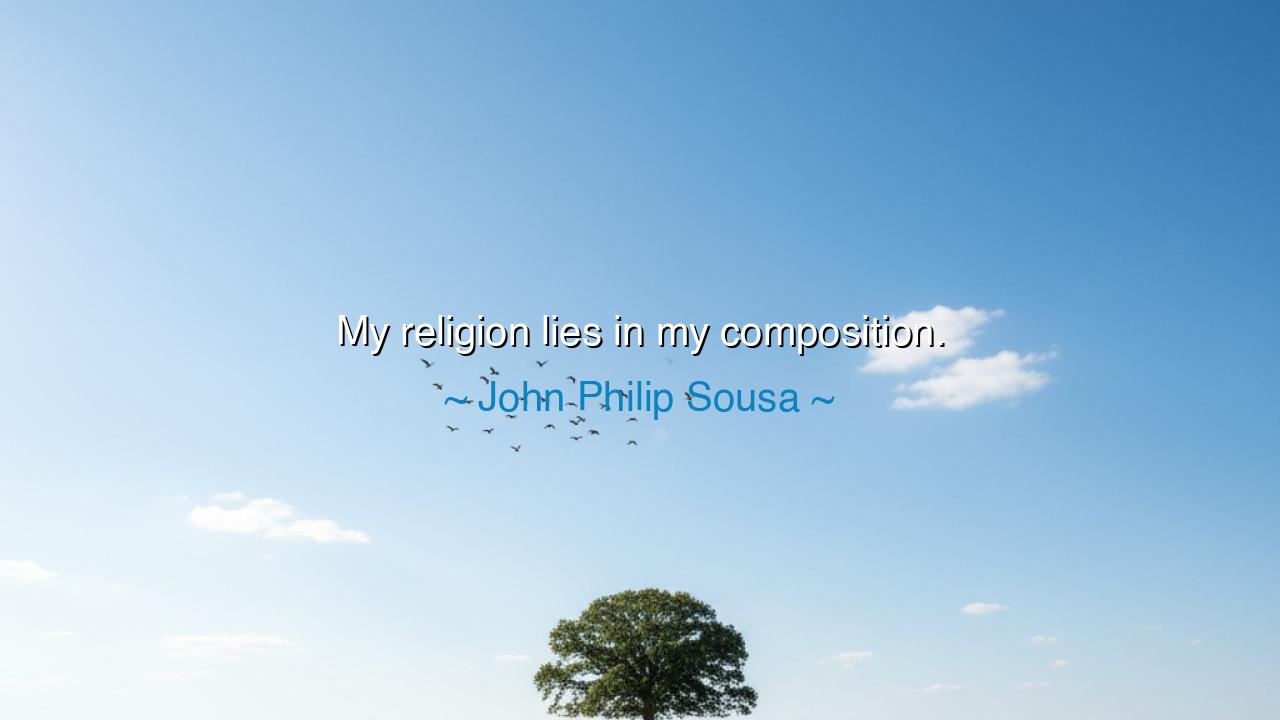
My religion lies in my composition.






In the heart of human existence, there lies a deep and resonant truth: faith and religion are not always defined by the rituals or traditions we follow, but by the essence of what we create, how we live, and the spirit with which we breathe life into the world. John Philip Sousa, the great American composer, speaks with profound clarity when he declares, "My religion lies in my composition." In these words, he suggests that the true spirit of his faith is not found in external doctrines or prescribed ceremonies, but in the very act of creation, in the music he brings to life. His composition becomes not only an artistic expression but a sacred act, a divine offering through which his soul connects to something greater than himself.
This concept of religion through creation is not new. The ancient philosophers and artists knew that the highest form of devotion was not in dogma or sacrifice but in the act of creating something that reflected the divine nature within. Plato spoke of the artist as a mirror to the divine, with creativity as the channel through which the eternal truths of the universe were revealed. Sousa, in his own way, echoes this ancient wisdom. His composition—the music that poured from his soul—is his act of devotion, his way of connecting with the divine, and his personal offering to the world. Through music, he expresses his faith in the beauty, order, and harmony of the universe.
Consider the story of Ludwig van Beethoven, whose struggles with deafness never deterred him from composing some of the most profound music the world has ever known. Despite the physical silence that threatened to consume him, Beethoven’s inner world resonated with the symphonies of the cosmos, and his music became his religion. In his compositions, he found communion with the divine—a sacred act of creation, not bound by the limitations of the senses. His faith was not found in places of worship or in external rituals, but in the act of translating the divine into melody, harmony, and rhythm. His composition was his prayer, his devotion, and his testament to the eternal spirit of life.
The same can be said for Sousa, whose marches were not simply musical arrangements but expressions of his soul's connection to the world. He understood that music has the power to elevate, to inspire, and to call forth the highest ideals in humanity. When he composed, he did not just create for the sake of sound, but as a way to channel his religion—a way to offer his deepest self to the world in the purest form he knew. Each note he wrote, each rhythm he crafted, became a manifestation of his faith in the human spirit and its ability to rise above adversity through unity, strength, and perseverance.
In a world that often looks for religion in the external, Sousa and others like him remind us that the divine can be expressed in many ways. To Sousa, composition was not just a career or an art—it was a calling. His religion was not confined to the walls of any temple or church, but was found in the very act of living his passion, of creating something that transcended the mundane and touched the eternal. His music, like the divine, was meant to be experienced, to stir the hearts and minds of all who heard it, and to awaken in them a sense of the sublime.
The lesson we draw from Sousa's words is profound: religion is not just about the rituals we perform but about the life we live and the creations we offer to the world. What we create, whether through music, art, literature, or any other form of expression, carries with it the essence of who we are and the faith we hold. Sousa teaches us that our religion can be found in our work, in our passions, and in the legacy we leave behind through the things we make with our hands and hearts.
In our own lives, we must ask ourselves: What is our religion? Is it confined to rituals, beliefs, and doctrines, or is it something deeper, something more intimate? The true act of devotion lies in how we live, how we create, and how we connect to the world around us. Whether through art, work, or acts of service, let us see our own creations as sacred acts, as offerings to the divine, and as ways to express the beauty of the human spirit. As Sousa reminds us, religion can lie in the simplest of acts of creation, and in this, we find our connection to something greater than ourselves.






AAdministratorAdministrator
Welcome, honored guests. Please leave a comment, we will respond soon